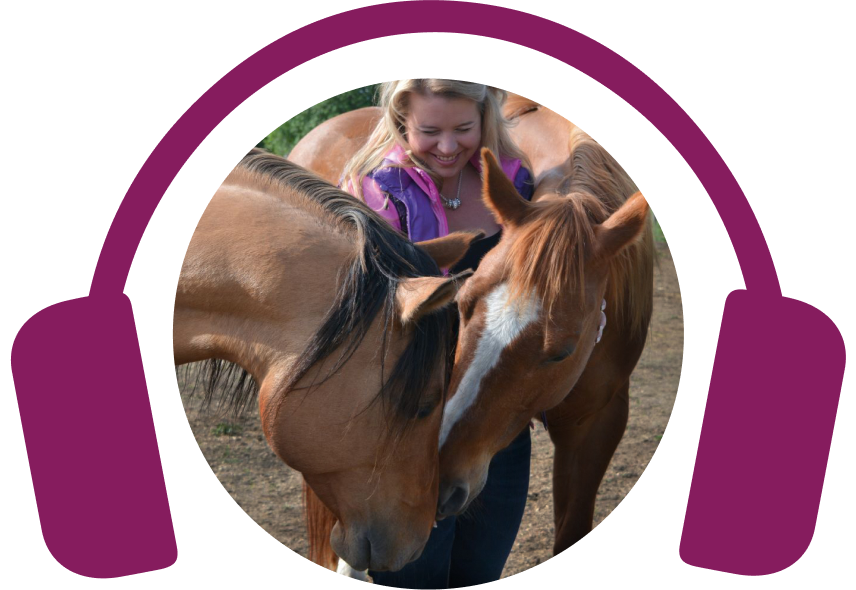Elisha’s Podcast
ELISHA’S PODCAST

Ready to get your horses on the path to better health?
This podcast was created to do just that.
Tune in to get new insights, perspectives, horse health tips, and real-life horse healing stories.
Take what you learn and apply it to your horse TODAY.

One Conversation at a time
From learning what to feed your horse and how to use nutrition effectively, to practicing prevention and approaching specific health challenges naturally, to just bringing your horse more joy and better health…
I’ve got you covered!

Check out my recent episodes
June has arrived, and everything is turning green again. With no more mud and ice around, it becomes much easier for horse owners living in wet and snowy areas to get their horses moving as they should once more. This week, I share some tips to get your horse moving in spring, which is particularly important if your horse is on grass, with few other options. Movement Matters Spring and summer grasses are rich in sugars, which can be risky for horses with metabolic issues like insulin resistance or laminitis. Supplements may help manage those conditions, but regular physical activity is essential for maintaining their metabolic balance and general health. Small Steps Small, regular efforts are more effective for horses than occasional intense workouts. Just 15 minutes of walking a few times a week can help to improve circulation, metabolism, muscle tone, detox pathways, and mood in horses. Encouraging Natural Movement Some horses are naturally less active when hay is readily available. You can encourage more movement by spreading their hay stations out, placing food and water at opposite ends of a paddock, or using slopes and snow to make horses do a little work for their meals, even in winter. Engaging the Body and Mind Scavenger hunts for alfalfa pellets or small pieces of carrot or cucumber will encourage your horse to move and provide mental stimulation without overfeeding. If your horse is not getting ridden, consider groundwork or short walks to boost circulation and muscle use. Use hoof boots for extra comfort if needed, and increase exercise gradually as your horse improves. Make It Work for Both of You Combine exercising your horse with your fitness goals. If your goal is 10,000 steps a day, you can spend some time walking your horse around the pasture or driveway. For minis or horses that cannot be ridden, ponying or trotting them alongside another horse or a slow-moving vehicle can be an effective alternative. Prioritize and Plan Movement Make scheduled movement a priority for your horse. Aim for 2–3 sessions of 15-30 minutes per week. Over time, even brief, consistent activity will offer meaningful improvements. Supplements can support equine health, but movement is still a non-negotiable for managing sugar levels in horses, building their strength, and maintaining their long-term well-being. Links and resources: Connect with Elisha Edwards on her website Join my email list to be notified about new podcast releases and upcoming webinars. Free Webinar Masterclass: Four Steps to Solving Equine Metabolic Syndrome Naturally Register for my self-paced course, Resolving Equine Metabolic Syndrome Naturally. This week, we are taking a closer look at equine sarcoids. Equine sarcoids are a common issue that can be concerning for horse owners. These skin growths are neither serious nor life-threatening, but they can be unsightly and sometimes tricky to manage. They tend to vary in appearance and location, and in some cases, can go unnoticed until they become more visibly pronounced. What Are Equine Sarcoids? Sarcoids are skin tumors that account for 36 to 40% of equine tumors. They can be flat, raised, crusty, weepy, or ulcerated, and can grow and spread at different rates. There are two main types: dry sarcoids and ulcerated (weepy and inflamed) sarcoids. They are generally benign and don’t spread to internal organs, but they can cause serious problems if they obstruct bodily functions like urination or defecation. Conventional vs. Holistic Approaches With traditional veterinary treatments, which include cutting, freezing, or surgically removing sarcoids, recurrence is common. Holistic practitioners aim to understand why the sarcoids appeared in the first place. Removing growths will not solve the internal imbalance that allowed them to develop. Potential Causes and Triggers Sarcoids, which may originate from the bovine papillomavirus, behave like viruses, flaring up with stress, toxicity, and nutritional deficiencies. Horses with compromised immune systems due to anxiety, malnutrition, or chronic stress are more prone to developing sarcoids. Events like moving farms, losing a herd mate, accidents, poor-quality hay, or vaccines can act as triggers. Chemical Toxicity and Vaccines Sarcoids could result from exposure to chemicals. Sprays on hay, some feeds, and vaccines can attack horses’ immune systems. When their immune system is under strain, dormant viruses can activate, allowing sarcoids to spread rapidly. Sarcoids often tend to appear soon after vaccinations, especially in compromised horses. Skin as an Elimination Organ The skin acts as a pathway for the body to release toxins and reflect internal imbalances. When sarcoids appear on the skin, they are often signs of an internal issue. Malabsorption and Nutritional Gaps A horse may seem to be getting good nutrition, yet still be malnourished if it does not absorb nutrients properly. Ulcers or chronic nervous system stress can interfere with their nutrient uptake and contribute to a weakened immune system. Environmental and Age Factors At around 15, horses often start showing signs of conditions that have been building silently for years. Chronic stress, aging, and accumulated exposure to harmful substances can contribute to immune dysfunction and tumor development. The Role of Detoxification and the Liver The liver detoxifies chemicals, medications, and environmental toxins. If it is overburdened, the immune system suffers. Many horses show signs of liver strain if they have been on long-term medication or exposed to repeated vaccinations and chemical-laden feeds. Immune System and Pathogen Load Chronic issues like thrush, scratches, or recurrent parasite infections indicate a compromised immune system. Parasites, bacteria, viruses, mold, and fungi often coexist, increasing the toxic load and making it harder for horses to maintain internal balance. Using Nutritional Therapy Nutritional therapy is a preferred holistic strategy. It involves using single nutrients in specific doses to clean up toxicity, correct imbalances, and support immune health. Antioxidants like selenium and vitamin C can help to detoxify chemicals and support liver function. Links and resources: Connect with Elisha Edwards on her website Join my email list to be notified about new podcast releases and upcoming webinars. Free Webinar Masterclass: Four Steps to Solving Equine Metabolic Syndrome Naturally Register for my self-paced course, Resolving Equine Metabolic Syndrome Naturally. This week, we continue where we left off last week, exploring equine eye conditions through a holistic lens. A holistic approach focuses primarily on optimizing the diet and lifestyle of horses, providing everything they need to support their overall health and maintain healthy eyes. Long-Term Health Issues Often Begin with Deficiencies Chronic deficiencies, prolonged stress, and toxin exposure are often the root causes of long-term health issues in horses. Those problems develop slowly, sometimes taking years to show symptoms. Even though genetics may be an underlying factor, nutrition is crucial in determining health outcomes. Protecting the Eyes of Prey Animals Eyesight is critical for horses to feel safe. Vision loss increases their anxiety and vulnerability. Keeping blind or visually impaired horses calm, secure, and well-supported within a herd can help to reduce their stress and improve their quality of life. Antioxidants Play a Crucial Role in Prevention Antioxidants help reduce oxidative stress, support immune function and detox systems, and protect the sensitive eye tissues. Even without eye symptoms, improved nutrition supports clearer and healthier eyes. A targeted supplement plan should always match the specific needs of each horse. Selenium: An Underrated Powerhouse Selenium deficiency is common in horses, affecting their coat, muscles, metabolism, and more. Selenium indirectly supports the eyes by boosting antioxidant defenses, especially when paired with vitamin E. While it is not an eye-specific nutrient, selenium does contribute to overall equine resilience. Vitamin E is Essential and Often Deficient Vitamin E is often lacking in hay-fed horses. Vitamin E protects the tissues from oxidative damage and plays a key role in eye health and detox support. High doses may be required to correct deficiencies in horses, especially for performance or aging horses. The Right Dosage and Timing Matter Too many antioxidants at once can overwhelm the body. Start with one or two at low doses and monitor progress over several weeks. Horses with autoimmune issues, like uveitis, need especially careful and gradual supplementation. Zinc: The Surprise Ally for Eye Health Zinc supports metabolism, thyroid function, liver health, and immunity. It also helps with weepy eyes and visual clarity, likely due to its high concentration in ocular tissue and role in processing light. Zinc works well with vitamin A to support vision. Be Cautious and Responsive with Zinc Not all horses need zinc. Try using low doses of about 150 mg elemental zinc in an organic form and observe. If there is no visible improvement within 6–8 weeks, zinc might not be the right solution. Beta Carotene: A Natural Source of Eye Support Beta carotene, found in fresh forage and colorful foods like carrots, supports vision and immune health. It converts to vitamin A, which helps with light processing. Forage-based diets naturally provide more beta carotene than hay. Support Through Food Whenever Possible Whole foods and high-quality forage offer the best long-term nutritional support. While supplements are valuable, a varied, nutrient-dense diet reduces dependence on pills and powders and supports holistic, sustainable health. Links and resources: Connect with Elisha Edwards on her website Join my email list to be notified about new podcast releases and upcoming webinars. Free Webinar Masterclass: Four Steps to Solving Equine Metabolic Syndrome Naturally
Meet your host
Hi there, I’m Elisha Edwards

Meet your host
Hi there, I’m Elisha Edwards
I have helped guide thousands of horses back to good health over the years from a variety of different health challenges. And through my courses, webinars, and speaking engagements I educate and empower horse owner’s from around the world to take charge of their horse’s health using the holistic model of health care.
So I know first-hand how difficult and overwhelming it can be to navigate all the different opinions and conflicting information that you come across especially when your horse is faced with a health problem. In many cases, the journey is just as hard on the owners as it is on the horses.
I started Healing Horses with Elisha to guide you, support you, and encourage you through the process of prevention and recovery so you feel good about the decisions you’re making for them.
Here’s what I believe
I have seen countless horses with seemingly impossible health conditions that have been resolved so easily with the right combination of diet, nutrition, and natural remedies. In many cases, it is not the health conditions that prevents the horse from recovering, it is the lack of education, resources, and options that are available.
If the insight and information you gain from this podcast gives you some newfound hope or inspires you to take
a new approach then it has served it’s purpose.
Thank you for giving me the opportunity to help you improve your horse’s health.
Keep listening and learning. Your horse is worth it.
Listen Now
Tune in wherever you listen to your podcasts and follow me so you never miss an episode. I release a new one every Tuesday!

Leave a Review
Reviews help me reach more horses and also help me deliver more relevant content to you!

What my Listeners are saying

“Every time I think there is no way to top what you do – you elevate us to yet another level. I wish I had a fraction of your communication skills. You’re amazing and I am so grateful to be apart of the magic you are creating for horses and their humans.”
Tracey

“Your podcasts are fantastic! I get so excited to listen to the next one. I have 6 geriatric horses and your podcast has really opened my mind to new possibilities in their health and given me the strength to help them through hiccups in their well-being the past few months. I have a nursing education and you explain pathology better than my university professors.”
Sharon

“I can’t thank you enough for the Mindset Tips podcast. I really needed this reminder. It was just what I needed to hear to today.”



